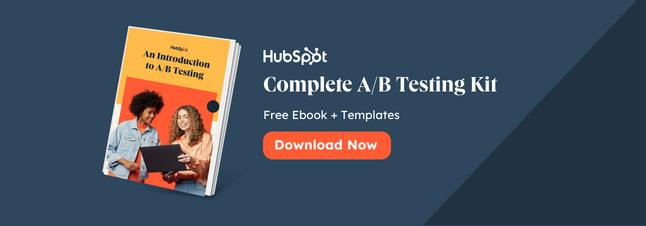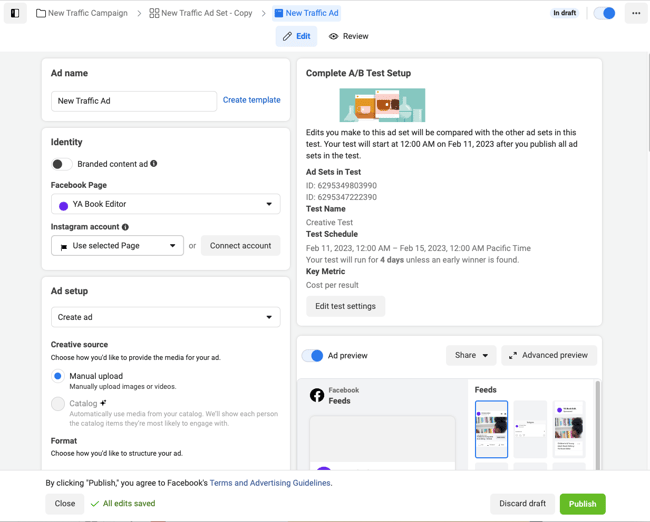A/B Testing on Facebook: How to Do It Right
Facebook offers many ways to test the performance of your Facebook ads before they go live. 

One of the most popular tools Facebook offers is A/B testing, which allows you to find out which imagery and copy resonates most with your audience.
Here, let’s dive into how you can A/B test your marketing ads on Facebook step-by-step. Even if you’re a beginner, don’t fear — split testing on Facebook is easy, and the boost in ROI can be exponential. Let’s get started.
A/B Testing Facebook Ads
A/B testing, or split testing, is a term used to describe the process of running marketing experiments to see which version connects better with your audience. Usually, they’re tested simultaneously, and the variables can be anything from layout to copy to multimedia.
A/B testing on Facebook is popular because it gives marketers an idea of what types of ads earn the highest conversion rates. Essentially, if you run a split test on Facebook, you can identify patterns in your highest performing ads and posts. This allows you to publish better and better ads, boosting your ROI.
On Facebook, you can create A/B tests in multiple ways. This is dependent on your preferred workflow; the results are virtually the same.
First, you can create an A/B test within the Ads Manager Toolbar. The Toolbar will let you use an ad campaign you’ve already created as a jumping-off point for your new test. Alternatively, you can manually duplicate a campaign or use the Experiments tool.
First, let’s go over the Toolbar method.
How to A/B Test Facebook Ads
- Go to Facebook Ads Manager.
- Select the campaign you’d like to A/B test.
- On the toolbar, click ‘A/B Test.’
- In the A/B test workflow, tap ‘Get Started.’
- Choose a variable to test.
- Name your test and determine the winning criteria.
- Edit and publish the alternate version of your ad.
The simplest way to split test Facebook ads is by using the Toolbar on your Ads Manager dashboard. Here’s how.
1. Go to Facebook Ads Manager.
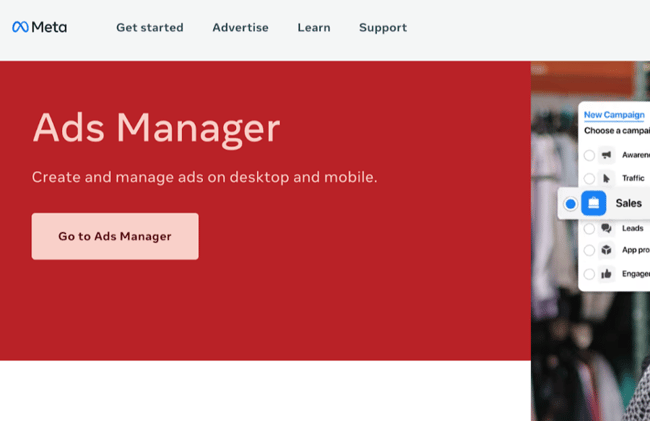
Ensure you’re logged into your Facebook account when you access the web page. Then, click on “Go to Ads Manager.” You’ll arrive at your dashboard, which has several tabs: Campaigns, Ad sets, and Ads. Today, we’ll work exclusively in the Campaigns tab.
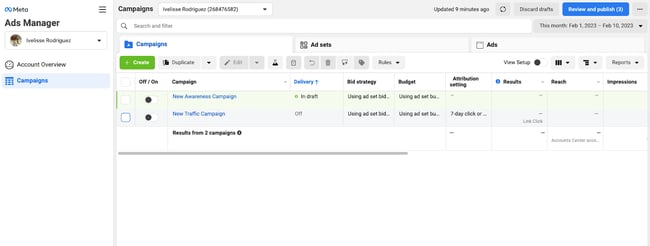
2. Select the campaign you’d like to A/B test.
To complete A/B tests, you’ll need to have an existing campaign. However, you can set up an A/B test as you create an ad, too. In the second screen of the ad creation process, toggle the “Create A/B test” button under “Campaign details.”
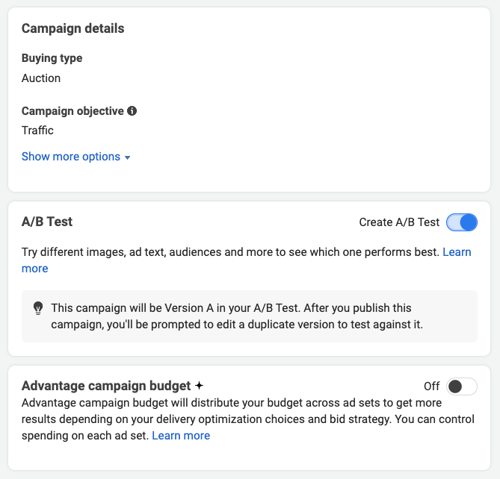
Otherwise, if you’re not creating a new ad, select the existing campaign you’d like to optimize from the list in the Campaigns tab.
3. On the toolbar, click “A/B Test.”
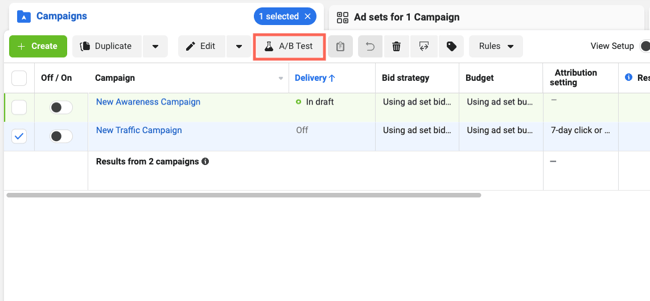
Once you’ve selected your campaign, you can begin creating your A/B test. At the top of your list of campaigns is a toolbar. Click the “A/B Test” button or beaker symbol, as shown below.
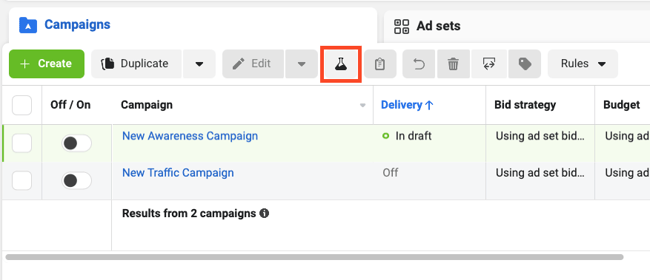
Alternatively, depending on your screen size, tap the button that reads “More”, then click “A/B Test” in the drop-down menu.
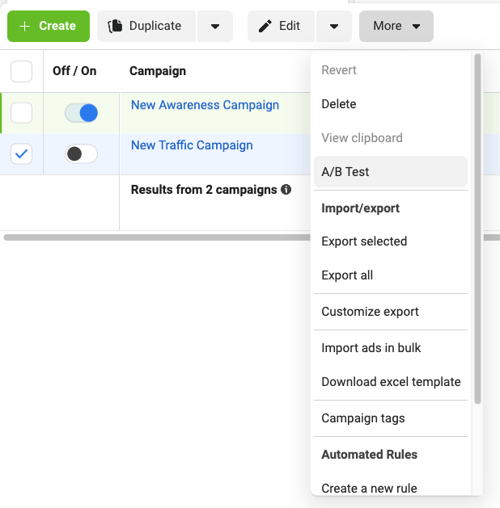
4. In the A/B test workflow, tap “Get Started.”
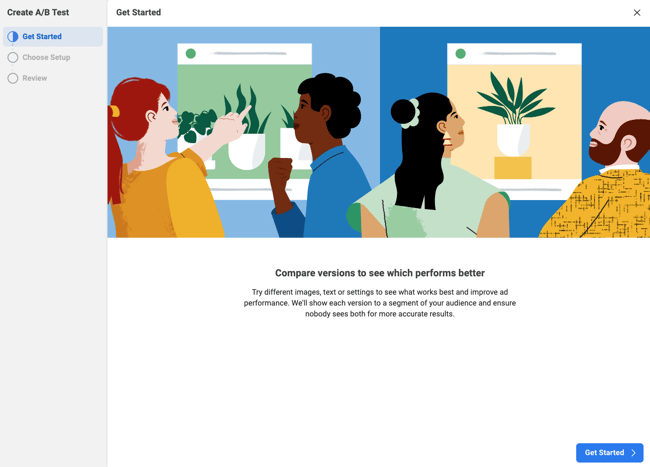
A pop-up will appear. Tap the blue “Get Started” button to begin. You’ll immediately be able to either make a copy of your ad to edit, or pick an existing ad you’ve already made.
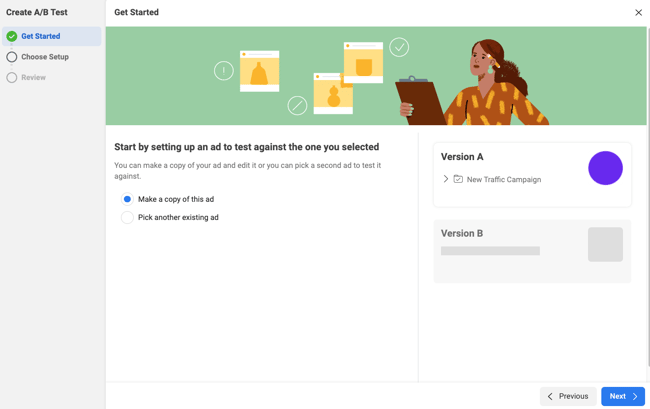
For this tutorial, we’ve chosen “Make a copy of this ad.” After you choose your preferred option, click “Next.”
5. Choose a variable to test.
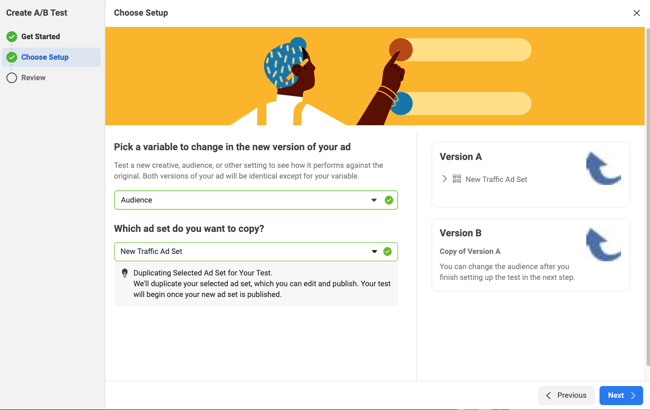
There are several different options for variable testing, and they’re categorized based on the goals of your campaign.
The variables are as follows:
-
Audience: This variable will look at the effectiveness of your ads based on the audiences you aim to reach. For instance, you can test different audiences based on region.
-
Creative: Creative A/B tests will focus on the visual assets of your ad. So if you want to test different images, videos, or carousels, you will choose the “Creative” option.
-
Placements: If you want to test where on Facebook your ad will be most effective, you’ll want to pick “Placements.” This option allows you to test automatic placements.
6. Name your test and determine the winning criteria.
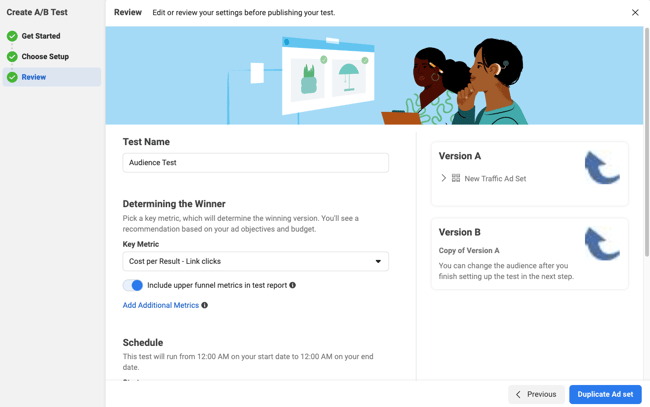
Name your test and choose the metrics you’ll use to determine the winner. You can also choose the time frame for how long your ad will run. After you’re done, tap “Duplicate Ad set.”
7. Edit and publish the alternate version of your ad.
In the next screen, you’ll be able to change your duplicate ad as desired. We recommend changing one variable, such as a single line of copy, an image, or another parameter. After you’re finished, click “Publish” in the bottom right-hand corner.
All done! You’re ready to perform your test. You can check the status of your test in Ads Manager.
If you find that you want to go with a different route for your A/B test, there are also options to set them up differently. For instance, let’s talk about duplication next.
Alternative Methods for Split Testing Facebook Ads
Method 1: Use Duplication to Create Facebook A/B Tests
When you choose this option, you can easily create a test by changing one variable in a nearly identical campaign or ad set. Note: This is for ads or campaigns that have already been created.
1. Access Ads Manager.
When you go to Ads Manager, go to your “Campaigns” tab. Here, you’ll see a list of your campaigns that are currently running. You’ll also see your drafted campaigns. You can choose either for duplication.
2. In the toolbar, select “Duplicate.”
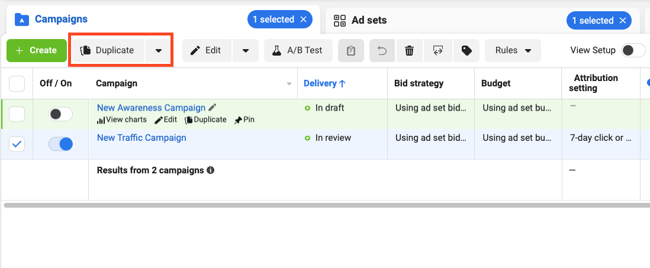
After you’ve decided which campaign or ad set you want to test, click the “Duplicate” button in the toolbar.
3. Click “New A/B test.”
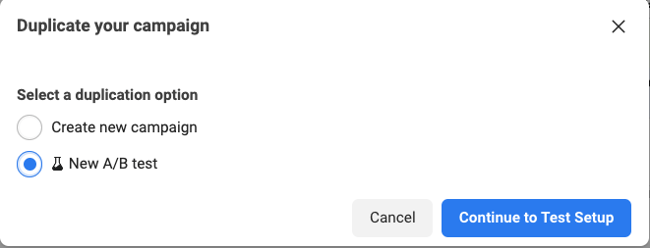
In the pop-up, select the “New A/B test” option. Remember, this option will let you choose a variable to change to analyze performance, so choose a campaign that fits that criteria.
4. In the A/B test workflow, choose a variable to test.
From here, the steps are the same as in the previous method. If you’re choosing an ad set to duplicate, Facebook will provide suggestions of which variable to change for you, and you can pick from there.
5. Name your test and determine the winning criteria.
Give a name to your A/B test and choose how you’ll determine the winner. Then, click “Duplicate Ad set.”
6. Edit and publish the alternate version of your ad.
After choosing your variable, you’ll see your tests next to each other in a preview. After making any necessary changes in this stage, click “Publish.”
When you publish your test, audiences will be able to interact with them, so make sure you’ve ironed out all the details before finalizing. However, you’ll be able to check back on your test in Ads Manager to access the most current insights.
Next, we’ll cover how to create an A/B test using the Experiments tool.
Method 2: Use Experiments to Create Facebook A/B Tests
The Experiments tool lets you create or duplicate ad campaigns to test. The difference between using Experiments is minor — the results are the same. Only use this option if it feels more user-friendly.
First, create the campaigns you’d like to test by clicking the green “Create” button and going through the steps. Duplicate the first campaign, change a single variable, and then head over to Experiments. Here’s how:
1. Go to Experiments.
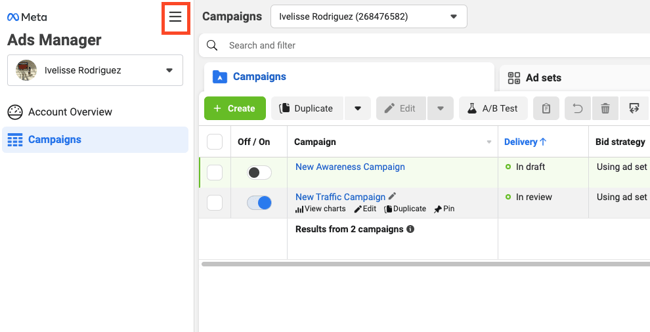
In your Ads Manager dashboard, tap the three vertical lines of the menu, which will show you the “All tools” pane. Then, tap “Experiments.”
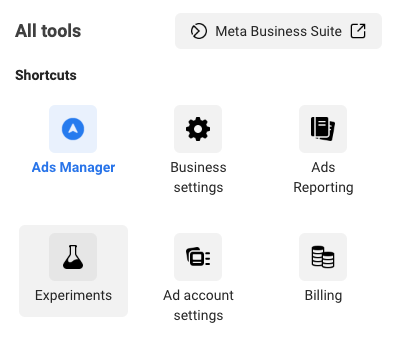
You can also search “Experiments” in Ads Manager’s built-in search tool.
2. Click “Get started” on the A/B Test card.
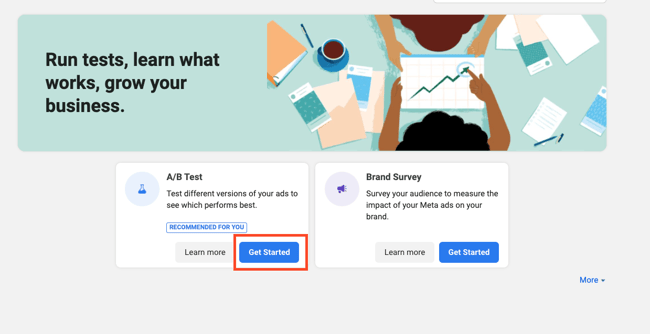
Click “Get Started.” When you do this, you’ll be taken to a page that lets you fill in the ad details.
3. Select your A/B test options.
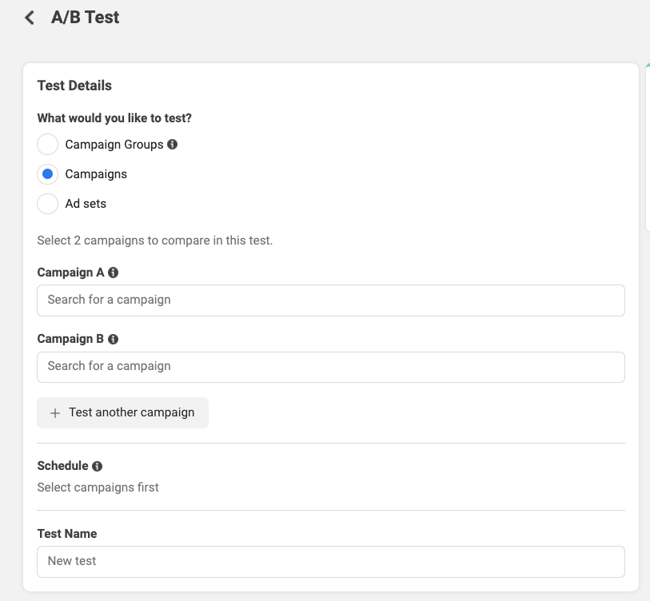
Choose the campaigns you’d like to test. It’s important to have created the campaigns you’d like to test beforehand, or they won’t appear in the list. You can also schedule the run time of your test and fill in the test name.
4. Determine the winning criteria.
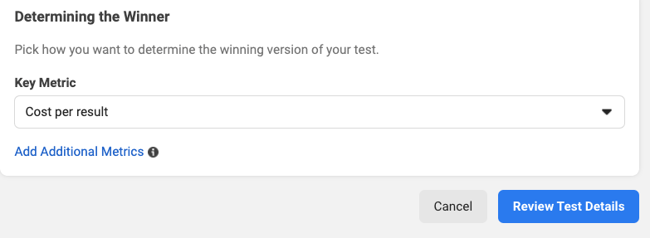
Choose which metrics Facebook should use to pick the winner. After you’re done, click “Review Test Details.”
5. Review your test and tap “Create Test.”
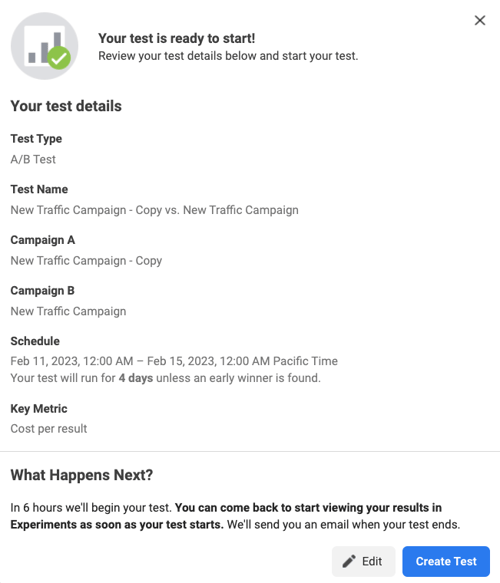
In the next screen, you’ll have an opportunity to see a summary of your test. If you’re happy with the results, click “Create Test.” If not, click “Edit” and make any necessary changes.
6. View all your experiments.
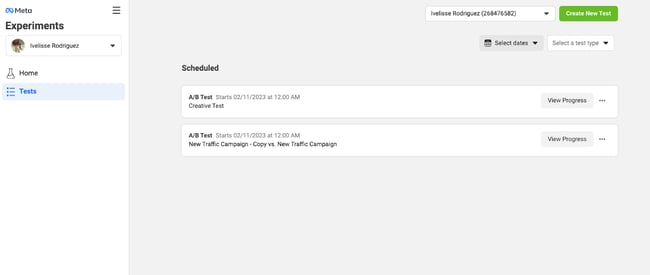
In the Experiments homepage, you can see all of your scheduled and running A/B tests. These include any you’ve created using the Experiments tool or through the Toolbar in the Campaigns dashboard.
Facebook uses the same base technology to run your A/B tests. The different versions of tests you can run help you make the best choices to optimize ad performance.
Next, let’s go over some best practices for running your A/B test on Facebook.
Facebook A/B Test Best Practices
Keep these best practices in mind before you begin your split test — they’ll help you run tests that are valuable and applicable to your next campaign.
1. Stay organized with tracking spreadsheets.
Because A/B tests can influence the future of your Facebook advertising strategy, it’s important to approach the process methodically and have clear goals and tracking in place. Utilizing an A/B test tracking spreadsheet ensures you can collect and analyze your data to make the most insightful, metrics-backed decisions.
 Download this Template
Download this Template
2. Choose one variable that’ll help you reach your goals.
When you A/B test on Facebook, make sure you’re only choosing one variable to test. There’s a separate multivariate test that you can run, but for A/B, one variable is key. Your test results will be more conclusive with only one variable.
3. Pick audiences that you want to reach with ads.
Choose a new audience for your test. They should be large enough to provide measurable results, but shouldn’t be the exact same audience as a campaign you’re already running. If they’re the same as a drafted campaign, that’s okay because they’re not published.
However, if you choose the exact same audience as a campaign you’re already running, Facebook’s system might mix up your ads and provide contaminated results.
4. Use hypotheses that are measurable and valuable.
In order to analyze your test results so they’re the most valuable to you, make sure your hypothesis is measurable. To put it another way: Make sure your hypothesis is clear, easy to understand, and able to be determined with an A/B test.
Your hypothesis can be as simple as, “Which method of delivery do my audience members respond the best to?” This question can be answered by using the Delivery Optimization A/B test on Facebook.
5. Make time frames that are ideal.
Recall that when you set up your A/B test, you can choose a time frame. You can choose to run your test for up to 30 days. Facebook’s Business Center suggests at least four days, which is enough time for the technology to produce accurate results.
6. Choose a budget that works for your business.
Facebook can provide an ideal budget for you based on your test details, or you can choose an ideal budget for yourself when you’re filling in test details. Setting an ideal budget will help you determine a winning strategy — it factors in Ad Spend into the success of your test.
According to one of HubSpot’s Paid Ads specialists, Nicole Ondracek, “A big value of split testing is being able to prevent audience overlap so you know that the same audience is not seeing multiple variants which could affect the results. That way, you can confidently say which one is the clear winner.”
A/B testing gives you a better understanding of audience behavior. Performing them on Facebook streamlines the process and gives you more comfortability with Facebook’s ad system.
Additionally, Ondracek mentions that depending on split testing results, advertisers can begin to shape what type of creative they need to use for the future.
This post was originally published in March 2013 and has been updated for comprehensiveness.
